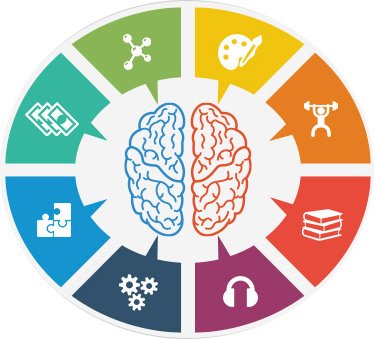Howard Gardner is a psychologist who proposed the hypothesis of multiple intelligences. This consists of eight types of intelligence that the human being can develop or not, we have neurologically speaking, brain potentials that are activated according to culture, various opportunities, decisions made by each person or family, by teaching or any other issue influential in the environment.

The eight types of intelligence:
- Linguistic-verbal intelligence: is related to speaking and writing effectively, memory and good diction. Generally developed by: political or religious leaders, speakers, lawyers, poets, writers.
- Musical Intelligence: There are some areas of the brain, usually located in the right hemisphere, that play important roles in music production. There are studies that suggest that those who possess this musical intelligence do so innately in early childhood. Even so we can develop it, with a little more effort, who do not have it

- Logical-mathematical intelligence: Those who possess this intelligence manifest it by solving math problems, geometric problems, and the ability to manipulate large numerical or logical patterns. Solving puzzles, assembling puzzles and reasoning logically is also related to this.
- Naturalistic intelligence: Naturalists are good observers and identifiers in the species of nature. Recognize plants, animals or people in our environment, interactions help us identify causes and effects that may happen.

- Space or visual intelligence: This intelligence is best developed by artists, photographers, architects, designers, publicists. It consists of making visual creations or visualizing with precision. Sadly, blind people, or accidents in the right cerebral hemisphere do not develop this intelligence in great power. To develop it, we can: do artistic activities, mental maps, visual memorisations, graphics, maps, construction games, etc.
- Interpersonal intelligence: Unlike intrapersonal intelligence, it develops by relating to others. It consists in being able to see the intentions of others even if they have hidden them, or in helping others in the solution of their personal problems. It is developed mostly by psychologists and psychiatrists, teachers, therapists and lawyers.

- Intrapersonal intelligence: People who own it can orientate themselves, their behavior, easily. It allows you to understand yourself and work better with you. The skills involved are: easy to set goals, personal skills, self control.
- Body-kinesthetic intelligence: Using the body to express emotions, as in dance, or compete in sports, or create visual arts, constitute this intelligence. Athletes, actors, models, dancers, develop this intelligence quickly and benefit from it.

This hypothesis shows us that the fact that someone is better than you doing something does not mean that they are more intelligent, they have simply developed a different type of intelligence than yours.